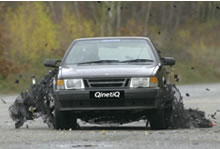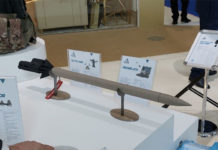Car-bombs have demonstrated their deadly effects in many attacks against military and civilian targets in many countries. While a single suicide bomber can carry a 10 – 15kg of explosives, that will create a deadly attack against unprotected people, car bombs can carry several tons of explosives, which can be devastating against large buildings. Therefore, controlling and denying mobility in the vicinity of the potential target is of critical importance. Road blocks have evolved to meet the new challenges of suicide attacks. Modern road blocks are designed to be transportable, deploy rapidly and absorb high energy to stop heavier vehicles at higher speeds.
 X-Net, designed by Qinetiq is a portable net constructed from super-strong dyneema polyethylene, with spikes positioned along its leading edge. X-Net is capable of bringing a vehicle to a complete standstill within 75 meters. X-Net can be used to secure checkpoints and deny traffic at secured areas, as well as on pursuit of suspicious vehicles, where opening fire is not an option. A different system is offered by General Dynamics – the Portable Vehicle Arresting Barrier comprised of a rapidly erecting net (erected within two seconds). The net wraps around the target’s wheels, bringing it to a stop within a distance of 35 meters. The system is designed to stop up to 7 ton vehicles at a speed of 45 mph. Much simpler but highly effective barrier is the Modular Vehicle Barrier (MVB) offered by Mifram. This lightweight steel structure is quickly assembled into a highly effective barrier, which stops a vehicle on the spot, with zero penetration for any sized ramming vehicle. Other devices are using high power microwave to disrupt vehicle electrical or electronic systems.
X-Net, designed by Qinetiq is a portable net constructed from super-strong dyneema polyethylene, with spikes positioned along its leading edge. X-Net is capable of bringing a vehicle to a complete standstill within 75 meters. X-Net can be used to secure checkpoints and deny traffic at secured areas, as well as on pursuit of suspicious vehicles, where opening fire is not an option. A different system is offered by General Dynamics – the Portable Vehicle Arresting Barrier comprised of a rapidly erecting net (erected within two seconds). The net wraps around the target’s wheels, bringing it to a stop within a distance of 35 meters. The system is designed to stop up to 7 ton vehicles at a speed of 45 mph. Much simpler but highly effective barrier is the Modular Vehicle Barrier (MVB) offered by Mifram. This lightweight steel structure is quickly assembled into a highly effective barrier, which stops a vehicle on the spot, with zero penetration for any sized ramming vehicle. Other devices are using high power microwave to disrupt vehicle electrical or electronic systems.
Additional parts of this article:

















